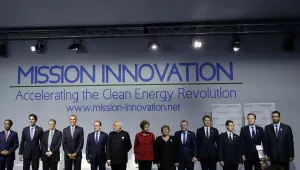Note
This op-ed was reprinted in the International Herald Tribune as "Let's Call an End to Oil Alarmism" on January 23, 2007.
OIL PRICES have ended their steep ascent — for now — and are headed downward. The near-universal alarm among politicians, pundits, and consumers over America's dependency on foreign oil has yielded to a wary sense of relief. But both the prior alarm and the current relief are misguided.
Few propositions are at once more widely accepted and less rooted in fact than the notion that increasing reliance on foreign oil is a national security threat requiring urgent action. Such concern reflects a view of markets that has been rendered obsolete by globalization. The oft-stated objective of "energy independence" is as devoid of substance and irrelevant to our security as "computer independence" or, for that matter, "clothing independence."
Consider the following facts:
Oil producers don't like oil prices that are "too high." Adel al-Jubeir, foreign policy adviser to Saudi Crown Prince Abdullah, offered this frank assessment to The Wall Street Journal in 2004, just as oil prices began to increase sharply: "We've got almost 30 percent of the world's oil. For us, the objective is to assure that oil remains an economically competitive source of energy. Oil prices that are too high reduce demand growth for oil and encourage the development of alternative energy sources."
In response, Saudi Arabia ramped up oil production, from 8.5 million barrels per day in 2002 to 11.1 million in 2005. Far more dependent on oil revenue than we are on oil, the Saudis lose if a high price today prompts their customers — us — to develop substitutes for use tomorrow.
The upswing in the price of many commodities, including oil, over the past five years reflects positive economic developments. In the next two decades or so, most of the world's population — including a couple of billion in China and India — will finally become full partners in the world economy.
This is good news. For the foreseeable future potential supply problems — whether caused by terrorism, political disputes, or other issues in the Middle East or elsewhere — will have far less of an impact on prices than these changes on the demand side.
Oil can't easily be used as a strategic instrument of aggression against the United States. Petro-alarmism focused on the Middle East often emphasizes the concentration of oil reserves and spare production capacity in a few oil-producing nations, particularly Saudi Arabia. But reserves are only useful as a strategic weapon in pushing prices down. Only by withholding output — and threatening their own livelihood — can producers push prices higher.
The impact of higher fuel prices on most US consumers is minimal. From 1980 to 2005, the share of consumer spending on energy actually dropped from 8 percent to 6 percent; the 2006 figure will be higher, but not enough to signal a consumer calamity. True, the impacts of higher energy prices are unevenly felt. But the fact that US oil companies celebrate record profits while the rural poor economize on trips to the grocery store is a matter of domestic politics, not international security.
Oil price movements do not have a major impact on the economy as a whole. What actual damage did the recent oil price run-up cause? When the price of oil doubled, as many long dreaded, which crippling effects were observed? None. Economic growth continued apace. Any slowing had more to do with higher interest rates. The US economy is far more adaptable than petro-alarmists would have us believe.
Regardless of the cause, rising oil prices during this decade have helped the national interest in the long term. In an open society with a market economy, only high prices have the brute power to compel the adjustments required to address the real energy-related challenge facing us: global climate change. For this reason, the public should worry not that oil prices might climb again, but rather that they might continue to fall. Energy independence is a hollow objective, but addressing threats from climate change is not.
Like the "traveling pants" in the series of teen novels by the same name, the notion that oil imports lead to energy insecurity magically fits everyone who tries it on — environmentalists, military hawks, foreign policy idealists, subsidy-seeking oil executives, and even anti-US propagandists. Yet while the energy insecurity argument fits an array of agendas, it does not fit the facts. Politicians and pundits alike would do well to put this treasured, but frayed, notion aside.
Philip Auerswald is director of the Center for Science and Technology Policy at George Mason University's School of Public Policy and a research associate at the Belfer Center for Science and International Affairs at the Kennedy School of Government.
Auerswald, Philip. “Calling an End to Oil Alarmism.” The Boston Globe, January 23, 2007





